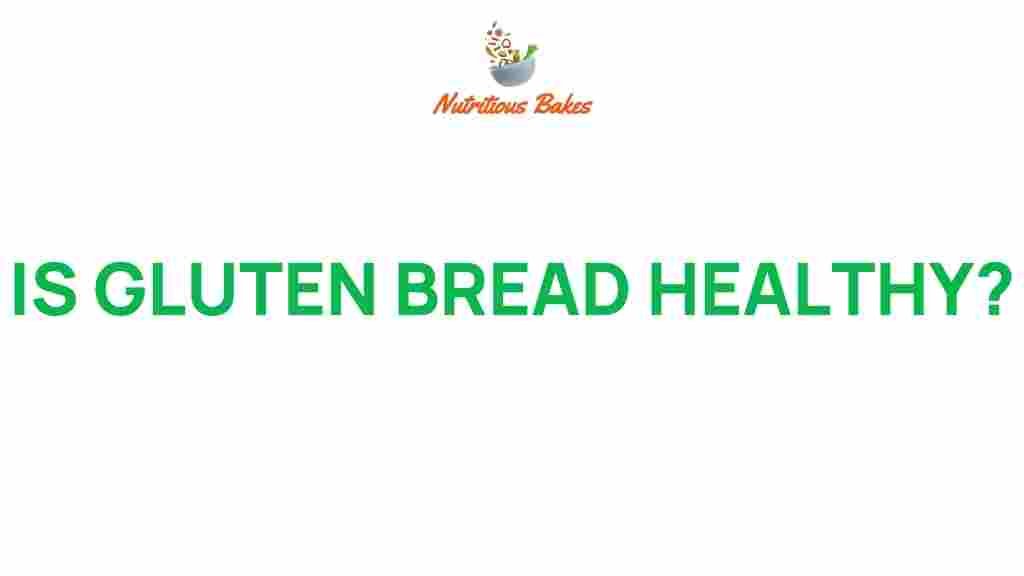Is Gluten Bread Healthy? Understanding Gluten, Bread Health, and Nutrition
In today’s world, where dietary choices are influenced by an array of health trends, the question of whether gluten bread is healthy has become a hot topic. With the rise of gluten-free diets, many individuals are left wondering if gluten is truly the enemy or if food myths have led them astray. This article aims to unravel the truth behind gluten bread, examining its nutritional aspects, its impact on digestive health, and how it fits into a wellness-focused lifestyle.
What is Gluten?
Gluten is a protein found in wheat and other grains such as barley and rye. It gives bread its chewy texture and helps it maintain shape. For many people, gluten is a harmless component of their diet. However, for others, particularly those with celiac disease or gluten sensitivity, consuming gluten can lead to serious health issues.
The Nutritional Profile of Bread
When evaluating the healthiness of gluten bread, it’s essential to consider its nutritional profile. Here are some key components:
- Carbohydrates: Bread is primarily a source of carbohydrates, which provide energy. Whole grain and whole wheat breads are generally more nutritious than white bread, offering fiber and essential nutrients.
- Fiber: Whole grain bread contains more fiber, which aids in digestion and promotes digestive health.
- Vitamins and Minerals: Bread can be a source of B vitamins, iron, and magnesium, especially when made from whole grains.
Gluten Bread and Digestive Health
For most individuals, consuming gluten bread does not negatively affect digestive health. In fact, the fiber content in whole grain bread can promote a healthy gut. However, for those with gluten intolerance or celiac disease, gluten can cause inflammation and damage to the intestinal lining.
Gluten-Free Alternatives
With the growing awareness of gluten-related disorders, the market for gluten-free products has expanded significantly. These alternatives often use different types of flours, such as:
- Rice flour
- Almond flour
- Coconut flour
- Oat flour
While gluten-free bread can be a viable option for those who need it, it’s important to note that not all gluten-free products are created equal. Some may be high in sugars and low in nutrients, so it’s crucial to read labels and choose whole food options.
Health Benefits of Gluten Bread
For individuals who can tolerate gluten, bread can offer several health benefits, including:
- Energy Source: As a carbohydrate-rich food, gluten bread provides quick energy, making it an excellent option for breakfast or snacks.
- Heart Health: Whole grain breads are linked to a lower risk of heart disease due to their fiber content and ability to lower cholesterol levels.
- Weight Management: The fiber in whole grain bread can help you feel full longer, which may assist with weight management.
Debunking Food Myths About Gluten
Several food myths surround gluten and bread health. Let’s address a few:
- Myth 1: Gluten is unhealthy for everyone.
In reality, gluten is only harmful to those with specific conditions. - Myth 2: Gluten-free diets are healthier for everyone.
Gluten-free processed foods can be just as unhealthy as regular bread if they lack nutrients. - Myth 3: Eating gluten causes weight gain.
Weight gain is related to overall diet and lifestyle, not solely gluten intake.
Making Informed Dietary Choices
When it comes to dietary choices, understanding your body’s needs is crucial. Here are some tips for making informed decisions about gluten and bread:
- Listen to your body: If you experience digestive discomfort after consuming gluten, consider consulting a healthcare professional.
- Choose whole grain options: Whole grain bread is generally healthier than white bread due to its higher fiber and nutrient content.
- Be cautious with gluten-free products: Not all gluten-free items are healthy; opt for whole food sources.
Step-by-Step: How to Choose the Right Bread for Your Health
Choosing the right bread can make a significant impact on your overall health. Follow these steps:
- Assess Your Health Needs: Determine if you have any gluten-related issues that require dietary adjustments.
- Read Labels: Look for breads that are made from whole grains and have minimal added sugars and preservatives.
- Consider Homemade Options: Making your own bread can ensure you know exactly what ingredients are included.
- Experiment with Alternatives: If you are gluten-sensitive, try various gluten-free grains and flours to find what you enjoy.
Troubleshooting Common Issues with Bread Consumption
Sometimes, people may face challenges when including bread in their diet. Here are some common issues and potential solutions:
- Digestive Discomfort: If you experience bloating or gas, consider reducing portion sizes or switching to whole grain options.
- Cravings for Sugary Bread: If you find yourself craving sweet, processed breads, look for healthier recipes or alternatives that use natural sweeteners.
- Difficulty Finding Good Gluten-Free Options: Experiment with local bakeries or online recipes to find healthier gluten-free bread that suits your taste.
Conclusion: Making Peace with Gluten and Bread Health
In conclusion, the question of whether gluten bread is healthy largely depends on individual dietary choices and health needs. For those who can tolerate gluten, consuming whole grain bread can offer numerous health benefits, supporting digestive health and overall wellness. However, for individuals with gluten sensitivity or celiac disease, it is essential to avoid gluten and seek out nutritious gluten-free alternatives.
By understanding the nutritional aspects of bread and debunking common food myths, you can make informed choices that align with your wellness goals. Remember, the key to a healthy diet is balance, variety, and a focus on whole foods. To learn more about dietary choices, visit this resource for additional information.
Ultimately, whether you choose gluten bread or a gluten-free option, the most important factor is how it fits into your overall dietary plan and supports your health. Embrace the journey of discovering what works best for you, and enjoy the delicious varieties of bread available in today’s market!
This article is in the category Diet and created by NutritiousBakes Team
